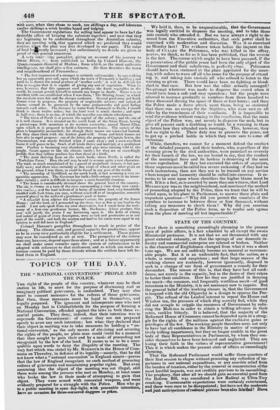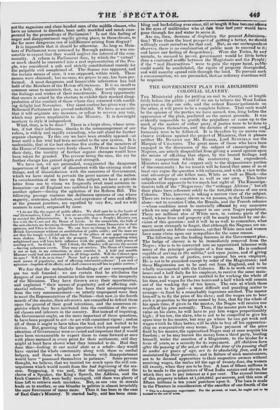STATE OF THE COUNTRY.
THAT there is something exceedingly alarming in the present state of public affairs, is a fact admitted by all except the swein Ministerial partisans. It is not that we are threatened with any great external calamity, or that the springs of our domestic in- dustry and commercial enterprise are relaxed or broken. Neither is the character or Englishmen changed from what it was a short time ago. We are not suddenly become an immoral or unrcason'- able people. But it is an undeniable fact, that the nation, as a whole, is uneasy and. suspicious ; and that large masses of the working classes are zealously, however ignorantly, disposed to seek in a change of our form of government a remedy for their discomfort. The reason of this is, that they have lost all confi- dence, not merely in the capacity, but in the desire of their rulers to better their condition: How far they are justified in denying the merit—the common, and frequently worthless merit—of good intentions to the Ministry, it is not necessary now to inquire. But the general belief of the working classes is, that the Government is.leagued with the old Oligarchy in a design to oppress the Peo- ple. The refusal of the Landed interest to repeal the House and Window tax, the pressure of which they scarcely feel, while they did not scruple to cripple the resources of Government by redu- cing the Malt-tax in order to obtain a trilling advance in their rents, rankles bitterly. It is believed, that the majority of the Reformed House of Commons cannot be depended upon in a strug. gle for the rights of the millions against the exclusive gains or privileges of the few. The working-people therefore seem not only to have lost all confidence in the Ministry (a matter of compams tively trifling importance), but they no longer confide in the great body of their Representatives in Parliament, by whom they con- sider themselves to have been betrayed and neglected. They are losing their faith in the virtues of representative government! This it is which makes the present state of affairs so exceedingly alarming. That the Reformed Parliament would suffer three quarters of their first session to 'elapse without procuring any reduction of itn, portance in our national expenditure, or any sensible relief. from the burden of taxation, either by the removal or COmmittatioá or the most hurtful imposts, was not credible previous to its assembling: The prophecy, that alter all we should gain-no essential good from . the Reform Bill, was considered a low Radical or Ultra-Tory croaking. Unreasonable-expectations were certainly entertained, and these were sure to be disappointed; but have not the moderate and just anticipations of rational, piriOns becttatau &hated? Have . notthe sagacious and clear-headed men of the middle Classes, who have no interest in disorder; been sadly mortified and much exas-
perated by the proceedings of Parliament ? • Is not this feeling of anger and disappointment rapidly giving place, in these classes, to the far more dangerous one of indifference arising from disgust?
It is impossible that it should be otherwise. As long as Mem- bers of Parliament were returned by Borough patrons, it was rea- sonable to expect that they would neglect the interest of the com- monalty. A reform in Parliament then, by which the " virtual" or mock should be converted into a real representation of the Peo- ple, was considered a safe and strictly constitutional remedy for the palpable evil complained of. The disease was apparent, and tbecertain means of cure, it was supposed, within reach. These means were obtained; but no cure, we grieve to say, has been per- formed. A most dangerous and lamentable infatuation has laid hold of the Members a the House of COMMOUS. It is an insult to common sense to maintain that, as a body, they really represent the feelings and wishes of their constituents. Every opportunity that occurs is seized by the electors to exhibit their marked disap- probation of the conduct of those whom they returned with confid- ing delight last November. Our sheet-anchor has given way : the Reformed Parliament has proved unfaithful. We have no security that it will originate any measure, or refuse to reverse any vote, which may prove unpalatable to the Ministry. It is downright mockery to style it independent.
What, then, is to be done ? There is a large class, whose num- ber, if.not their influence, thanks to the mismanagement of our rulers, is widely and rapidly extending, who call aloud for further organic changes. To this cry we have been steadily opposed—at least until a fair trial had been accorded to the new system. It is undeniable, that at the last election five sixths of the members of the House of Commons were freely chosen. If these men had done their duty, the inutility of further organic changes would have been taken for granted. The reverse being the case, the cry for further change has gained depth and strength.
We have not, wh are persuaded, exaggerated the dangerous importance of that spirit of discontent with the existing state of things, and of dissatisfaction with the measures of Government, which we have stated to pervade the great masses of the nation. In corroboration of our fears on this subject, we have ,a private letter from one to whom we frequently owed most accurate in- formation—as all England was indebted to his patriotic activity in another sphere—during the agitation of the Reform Bill. The following passage contains the .deliberate opinions of one whose sagacity; acuteness, information, and experience of men and, affairs at the present juncture, are -equalled by very few, and we will venture to assert, surpassed by none. .
• 4,1 do not like the aspect of public affairs. We shall soon be in the hands of real Destructives, I fear: For I can see no existing combination of public men to succeed the Administration. It is impossible that a People's Ministry can live with the Ct,urt and the House of Lords. In the meanwhile, the bulk of the non-electors are becoming throughout the country snore Democratic in their opinions, and Ultra in their ann. We can have no change in the form of the Hritish Government without an annihilation of Tobin: credit ; and the mass see not that the temple would fall upon theni if the pillars of our paper currency Were shaken. Alas ! I like not the prospect. Times are approaching when enlightened men will have little influence with the public, and little power of averting evil. So think I. Still I think, the Ministry will survive the session —barring unforeseen events. They may yet retrieve. The House Of Commons is not so bad, in my estimation, as some consider it. A bold and sensible Minister could lead and command it in all things useful. Will the Cabinet open its eyes ? Will it do so in time? Never had a party such an opportunity— such means Of popularity, and of effecting substantial reforms ! I urn sick of agitation—hopeless of its effects; and shall concern myself less in public inatters.', We fear that the melancholy forebodings of our correspondent are too well founded : We are certain . that he attributes the dangers of our present situation to the true sourcethe incapacity Of the Ministers. They have thrown away their opportunities, and neglected "their means :of popularity, and of effecting sub- stantial reforms." So palpable has been their mismanagement from the very Commencement—so utterly unprepared were they to meet the Representatives of the Nation—that now, in the fourth month of the session, their advocates are compelled to defend them Upon the ground of their good intentions, and the numerous in- quiries which they have instituted into the condition of the seve- ral classes and interests in the country. But instead of inquiring,. the GoYerninent ought, on the more important of those questions, to have been prepared- to act--to act with consistent vigour • and on all of them it ought to have taken the lead, and not waited to be driven. But, granting that the questions which pressed upon the attention of Government ivere so varied and important that it would have been unreaSanable to expect them to come forward at once with plain Matured in every • point for their . settlement, still they Might at leait have shown what they intended to do. . Had they done thislooking , to our social state as a . whole—they would hive Carried the Whole community along with them as cordial helpers, and those who are now furious with disappointment would have "'possessed themselves in patience." Some persons thought; We believe, that We 'Minted too much upon the evil con- sequences which would result from the .bact_ beginning of the Ses- sion. Supposing, it was said, that the intriguing about the choice of a Speaker, the King's' Speech,. the. Address, and the Irish Coercive Bill, were badly Managed, still there was plenty of time left to retrieve such' mistakes.- But,' as one vice in morals leech on to another, so One bhisicler in politics is almost invariably the sure forerunner Of saanvitsorel • • Thin it, has been in the case oft-Earl GRity'S Ministrj. ies,titrtea: badly, - and has been stum- blind and backsliding ever since, till at length it has became Odious in the eyes of thtiltitudes who at this time lad yea? Would have gone through fire and water to serve it. Are we, then, desirous of displacing the present ./.1.thtlinistra- tion ?, Were there the least prospeet of getting a better, *e should willingly exert ourselves for that end. But, as our .corsespondent observes, there is no combination of public men to succeed to it; and hence our feeling of despondency. Were the Tories, by any miracle, to succeed to poa er, government would be little better than a continued- scuffle between the Magistrate and the People.; if the " real Destructives " were to gain the upper hand, public credit would be annihilated, the rights of property disregarded, and wild anarelly spread ruin through the land. To prevent such a consummation, we are persuaded, that no ordinary exertions will be required.

















 Previous page
Previous page